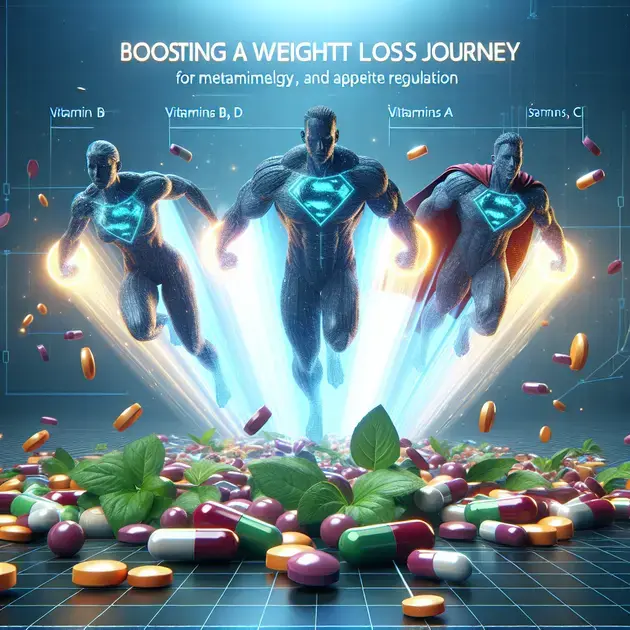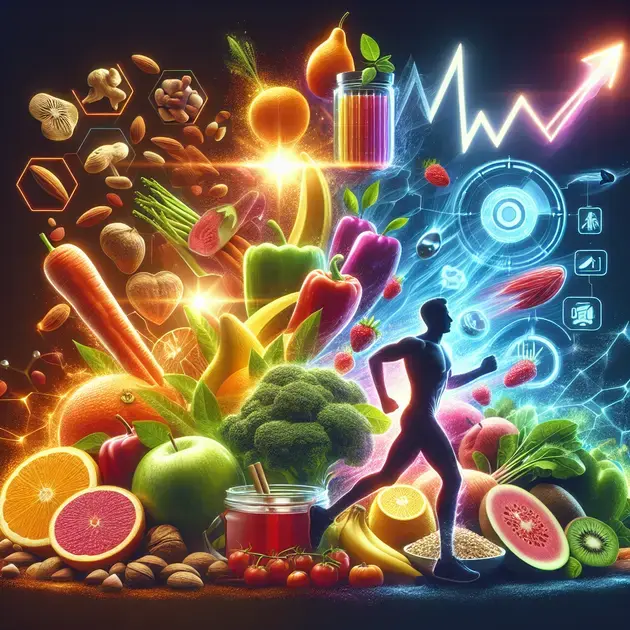Are you looking to boost your weight loss journey with a natural and effective approach? One key factor to consider is incorporating essential vitamins into your daily routine. These vitamins play a crucial role in supporting your body’s metabolism and overall well-being.
Research has shown that certain vitamins, such as Vitamin B12, Vitamin D, and Vitamin C, can aid in weight loss by increasing energy levels, enhancing fat metabolism, and regulating appetite. By ensuring you have an adequate intake of these essential vitamins, you can optimize your body’s ability to shed those extra pounds and reach your weight loss goals more efficiently.

Understanding the Role of Vitamin B12 in Weight Loss
Vitamin B12, also known as cobalamin, plays a crucial role in aiding weight loss. This vitamin is essential for the metabolism of fats and proteins in the body, which are vital for energy production and maintaining a healthy weight. One way to ensure you are getting enough Vitamin B12 is by incorporating foods rich in this vitamin into your diet, such as meat, fish, dairy products, and fortified cereals.
For those who may have a deficiency in Vitamin B12, supplementation is also an option. You can easily find Vitamin B12 supplements at your local pharmacy or health food store. One recommended app for tracking your Vitamin B12 intake and ensuring you meet your daily requirements is MyFitnessPal, which offers a database of foods and their nutritional content.
In addition to diet and supplementation, it’s important to note that Vitamin B12 is best absorbed by the body through injections. If you suspect you have a severe deficiency or have trouble absorbing this vitamin through oral supplements, consult with a healthcare provider to discuss the option of receiving Vitamin B12 injections.
By understanding the role of Vitamin B12 in weight loss and taking the necessary steps to ensure you are meeting your daily requirements, you can support your body’s metabolism and energy production, ultimately aiding in your weight loss journey.
The Impact of Vitamin D on Energy Levels and Fat Metabolism
Vitamin D, often referred to as the “sunshine vitamin,” is essential for maintaining optimal energy levels and supporting fat metabolism in the body. This crucial vitamin plays a role in regulating mood, energy, and overall well-being, making it an important component of a weight loss journey. One of the best sources of Vitamin D is sunlight, as the body produces this vitamin when the skin is exposed to sunlight.
If getting enough sunlight is a challenge, incorporating Vitamin D-rich foods into your diet is another way to ensure you are meeting your daily requirements. Fatty fish, fortified dairy products, and egg yolks are excellent sources of Vitamin D. To track your Vitamin D intake, you can use apps like Cronometer, which provide a breakdown of your nutrient consumption and offer recommendations for meeting your daily Vitamin D needs.
In cases where dietary sources and sunlight exposure are insufficient, Vitamin D supplements are available over-the-counter. Consult with a healthcare provider to determine the appropriate dosage for your individual needs and to ensure you are not exceeding the recommended intake levels.
By harnessing the power of Vitamin D to support energy levels and fat metabolism, you can optimize your body’s functions and enhance your weight loss efforts.
Harnessing the Power of Vitamin C to Regulate Appetite and Support Overall Well-Being
Vitamin C, also known as ascorbic acid, is a powerful antioxidant that plays a significant role in regulating appetite and supporting overall well-being. This essential vitamin aids in the synthesis of carnitine, a compound that helps the body convert fat into energy, making it a valuable asset in weight loss.
To ensure you are getting enough Vitamin C, include a variety of fruits and vegetables in your diet, such as oranges, strawberries, bell peppers, and broccoli. These foods are rich in Vitamin C and can help you meet your daily requirements. You can track your Vitamin C intake using apps like Lose It!, which offer food tracking features and nutritional information.
In addition to dietary sources, Vitamin C supplements are available for those who may need an extra boost. It’s important to note that high doses of Vitamin C can cause gastrointestinal discomfort, so talk to your healthcare provider before starting any supplementation regimen.
By harnessing the power of Vitamin C to regulate appetite, support overall well-being, and aid in fat metabolism, you can enhance your weight loss journey and promote a healthy lifestyle.

Optimizing Your Fitness Goals with Key Nutrients
Optimizing your fitness goals with key nutrients is essential for achieving peak performance and overall well-being. By incorporating the right combination of vitamins, minerals, and other essential nutrients into your diet, you can support your body’s ability to build muscle, burn fat, and recover effectively after workouts. One key nutrient that plays a crucial role in optimizing fitness goals is vitamin E.
Vitamin E is a powerful antioxidant that helps protect the cells in your body from oxidative stress caused by intense physical activity. This can lead to faster recovery times, reduced muscle soreness, and improved overall performance. Additionally, vitamin E has been shown to support cardiovascular health, which is vital for endurance athletes and those looking to improve their aerobic capacity.
Incorporating vitamin E-rich foods such as almonds, sunflower seeds, and spinach into your diet can help ensure you’re getting an adequate amount of this important nutrient. However, for individuals with specific dietary restrictions or deficiencies, a supplement may be necessary to reach optimal levels.
By prioritizing key nutrients like vitamin E in your diet and supplementation regimen, you can enhance your fitness goals and take your performance to the next level. Whether you’re a competitive athlete or a casual fitness enthusiast, the benefits of optimizing your nutrient intake are undeniable.
The Benefits of Vitamin E in Exercise Performance
The benefits of vitamin E in exercise performance are well-documented and can have a significant impact on your overall fitness journey. As mentioned earlier, vitamin E’s antioxidant properties help combat oxidative stress and inflammation in the body, which can be especially beneficial during intense workouts or training sessions.
Additionally, vitamin E has been shown to improve blood flow and circulation, which can enhance nutrient delivery to muscles and promote faster recovery. This means less downtime between workouts and increased performance over time.
Studies have also suggested that vitamin E may play a role in reducing exercise-induced muscle damage, leading to less soreness and quicker repair. This is crucial for anyone looking to push their limits in the gym or on the field.
Whether you’re a professional athlete or someone who enjoys staying active, incorporating vitamin E into your daily routine can help optimize your exercise performance and support your long-term fitness goals.
Exploring the Connection Between Vitamin A and Muscle Repair
When it comes to muscle repair and recovery, vitamin A plays a critical role in supporting these processes. Vitamin A is essential for protein synthesis, which is key to rebuilding and repairing muscle tissue after strenuous exercise or physical activity.
In addition to its role in muscle repair, vitamin A also supports immune function, helping to reduce the risk of illness or infection that could hinder your training progress. By ensuring you have an adequate intake of vitamin A, you can promote a healthy immune system and support overall well-being.
Foods rich in vitamin A include carrots, sweet potatoes, and liver, among others. Incorporating these nutrient-dense foods into your diet can help you meet your vitamin A needs and support optimal muscle recovery and repair.
By exploring the connection between vitamin A and muscle repair, you can better understand the importance of this essential nutrient in your fitness journey. Whether you’re looking to enhance recovery after a tough workout or support ongoing muscle growth, vitamin A should not be overlooked in your nutritional plan.
Conclusion
Optimizing fitness goals through key nutrients like vitamin E and vitamin A is crucial for achieving peak performance and overall well-being. By including these vital nutrients in your diet, you can aid in muscle building, fat burning, and effective post-workout recovery.
Vitamin E, known for its antioxidant properties, protects cells from oxidative stress induced by physical activity, leading to quicker recovery, reduced muscle soreness, and enhanced performance. Moreover, it supports cardiovascular health, essential for endurance athletes and those focusing on improving aerobic capacity.
On the other hand, Vitamin A plays a vital role in muscle repair and recovery by promoting protein synthesis critical for rebuilding muscle tissue post-exercise. It also bolsters immune function, reducing the risk of illnesses that could impede training progress. Including foods rich in Vitamin A like carrots and sweet potatoes in your diet can aid in optimal muscle recovery and repair.